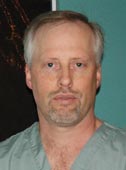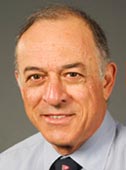Industrial Interests and Surgeons' Obligations
A spirited debate on the role of industry funding in
surgery was the highlight of the winter quarter dinner
meeting of the St. Michael's Hospital surgery department.
A background paper provided to the speakers by
orthopaedic resident Mark Camp described how the US
Federal government, concerned about the escalating cost
of 700,000 hip and knee replacements per year, initiated
an investigation by the Department of Justice. Criminal
charges were filed against four major orthopaedic manufacturers
for violating federal anti-kickback statutes. US
$800 million had been paid to orthopaedic consultants
as royalties or consulting fees for teaching, research,
training sales representatives in the operating room and
travel. Fines of $310 million have been paid under a
deferred prosecution agreement, and criminal prosecution
of individual surgeons is threatened.

Tim Daniels
|
Orthopaedic surgeon Tim
Daniels, who organized the
meeting, introduced the speakers
and the topic. He told us
that 90% of the $21 billion
pharmaceutical marketing budget
is directed at physicians.
Research funding for multicentred
trials in the US is heavily
weighted toward industry.
Private foundations provide
$10 billion, federal funds $29 billion, and industry $60
billion. NIH funding for research has remained static as
the burden of disease increases. 94% of US physicians
have some relationship with industry. The Food and
Drug Administration cannot find enough unconflicted
physicians to fill its advisory boards. Awareness of abuse,
kickbacks and biased publications is eroding public trust
in the profession. If funding by industry were prohibited,
the gap will never be filled by public or private sources.
Industry has an important role, but its governance is currently
under critical review.
Doug Thomson, Executive Director of the Canadian
Orthopaedic Association (COA) and former industry
CEO, set the stage, asking: "How far is too far in the surgeon-
industry relationship?" He showed a flurry of news
headlines describing bribes, kickbacks, and confusion
about conflict of interest management. He quoted the
Royal College Surgical Ethics Curriculum and clarified
the values guiding the ethic of business, where "financial
rewards are culturally accepted for enhancing profits".
He cited the standards of the COA and advocated a
publicly accessible website for publishing an "open book
account" of all industry payments to physicians. This
accounting was mandated by the US court for Zimmer,
Biomet, Depuy, and Smith & Nephew, as part of the
court's preliminary settlements with these orthopaedic
manufacturers. The Cleveland Clinic, under the leadership
of its innovative and entrepreneurial CEO, cardiac
surgeon Toby Cosgrove, will now voluntarily publish all
industry payments to its physicians and surgeons.

Allan Gross
|
Orthopaedic surgeon and Blue
Jays team doctor Allan Gross claimed that "we've come so
far by doing it just right". He
offered the evidence that some
surgeons voluntarily divert
industry funds to third party
oversight by their department,
hospital or training program
director, and they contribute
directly from their salaries to
support research. He described the critical importance
to industry of surgeon designers, who uniquely know the
field conditions that will determine the usefulness of a
medical device. They should be compensated through
royalties or contracts - if and only if they participate in
the design. Surgeon consultants' legitimate role should be
paid by reasonable fees on an hourly or annual basis for
the development of courses, skill centres and for preceptorships
and direct surgeon-to-surgeon case consultation
and reviews. He decried the misuse of royalties or annual
fees when they are used as a kickback to promote the
company's business interests, and the use of lavish resorts
for education, describing these as efforts to recruit surgeons,
fellows and residents to be future customers.
|

Solly Benatar
|
Physician bioethicist Solly
Benatar, Emeritus Professor
of Medicine at the University
of Cape Town and a faculty
member of the University
of Toronto's Joint Centre for
Bioethics took us to the 30,000
foot level. Based on the writing
of Eliot Freidson, (1) he argued
that the logic of professionalism,
rather than commercialism,
consumerism, bureaucracy or law should guide
our management of this issue. The logic of professionalism
is based on trust in the knowledge, dedication
and self-regulation of professionals, whereas market
logic is based on freedom, rational choice, competition
and consumerism. Professionalism is being eroded
by expansion of self-interest and expanded control
of research by the financial interests of industry. The
conflict illustrated in Solly's nearby figure pulls us
away from surgery as a calling to a valued social service
and toward personal entrepreneurial (2) self-interested
striving, a highly valued activity in the market ideology
and logic. Quoting Edmund Pellegrino, his suggested
solutions include "reconfiguring medical economics to
foster the classical ideals of commitment to individuals,
public good, and altruism"; and "strengthening of
institutional ethics, taking into account the roles and
legitimate interests and obligations of diverse parties".
He cited the recent examples of erosion of professionalism
such as the revelation of kickbacks ("payment for
collaboration, especially for illicit profits" Canadian
Oxford Dictionary) and falsification of conflict of interest
disclosure forms at prominent American universities.
During a vigorous discussion period, Solly made
reference to the imaginative and challenging 'Health
Impact Fund' project (under the leadership of Thomas
Pogge) to reshape pharmaceutical industry activites
in a manner that enables development of drugs with
potentially major beneficial effects on the health of
large numbers of underserved people without reducing
pharmaeuctical company earnings.
The surgeons expressed enthusiastic appreciation for
the insights and the stimulating discourse provided by
all of the participants, as exemplified by Jim Waddell's
comments:
"This discussion was illuminating for all of us and though
it focused primarily on orthopaedic surgery because of
topicality, the dilemma about industry-physician relations
is common in all areas of medicine and surgery. I
don't see this as a black and white issue - certainly I'm
not naïve enough to think that all physicians are good
and all of industry is bad. There is a partnership between
physicians and industry that is essential to the wellbeing
of both. The problem as I see it is that the ethics of business
and the ethics of professionalism are different. That
doesn't make the ethics of one good and the ethics of
the other bad - just different. What's desperately needed
is some type of interface between the two groups that
satisfies the ethical needs of both, rewards people fairly
for their intellectual property and ensures continued
advances in medical care through responsible product
development."
M.M.
(1) Freidson, Eliot. Professionalism: The Third Logic Chicago:
University of Chicago Press, 2001.
(2) An entrepreneur is "a person who starts or manages a commercial
enterprise, especially one involving initiative and
financial risk". (Canadian Oxford Dictionary)
|